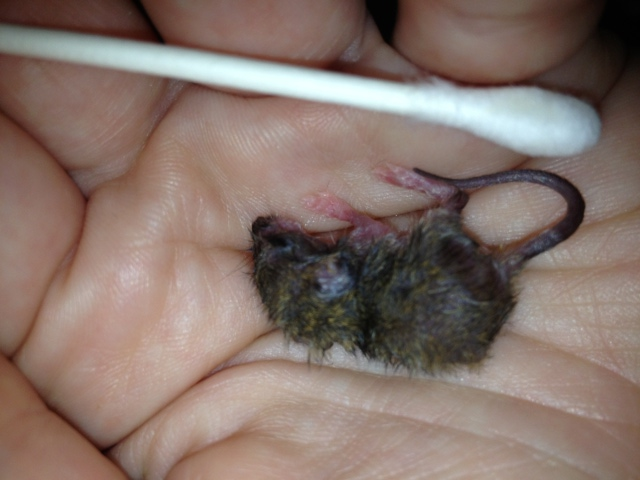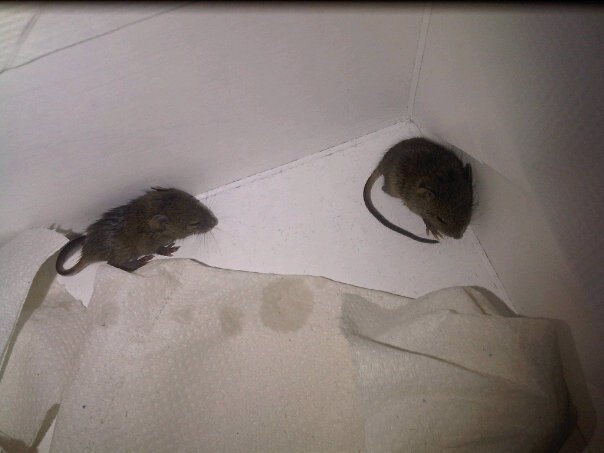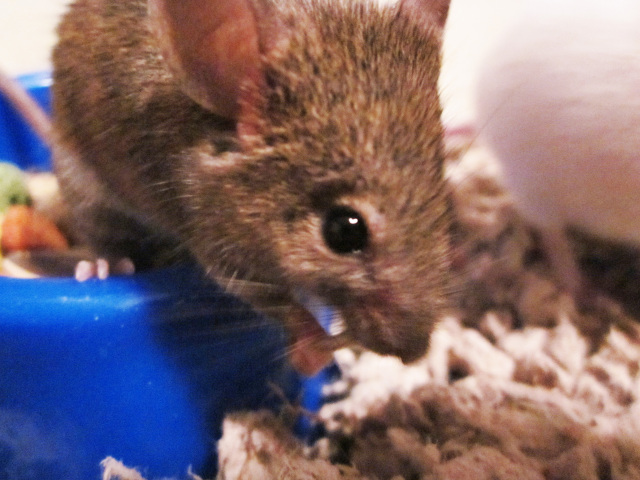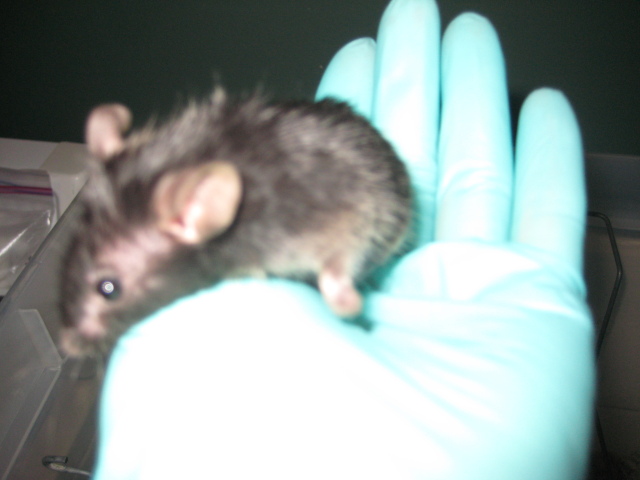QuestionQUESTION: Dear Natasha, I'll tell the story in the first paragraph, and ask my question in the second paragraph.
I too found a very sick baby deermouse in my slipper after her mother was killed by a cat in my apartment. The slipper had been packed in my suitcase for several hours out in below-freezing weather. We thought she was dead and I almost threw her out, but she kicked her tiny legs.. We fed her infant formula in a dropper and kept her on a heating pad for days until her eyes were fully open and she seemed curious enough to start investigating other foods -- now she has a nice coat of fur and she eats bananas, cheerios, and seed treats with gusto, and picks at petstore mouse food. I'm also having trouble figuring out if she's drinking water or not -- she doesn't seem particularly interested in it, but I'll try the method you suggested earlier. She is surprisingly social, sweet, beloved, and really seems to adore her life with people.
HOWEVER -- this is our question. What are the health risks that people should consider when living with a tame wild mouse? Which viruses should we be worried about? Is there a way to prevent or test for them? The veterinarian here won't help with a wild mouse, and the other wildlife offices I've been referred to have been unhelpful so far. I've been using gloves at the firm request of my husband, a concerned MD. Might you be able to either soothe our fears, or recommend a course of action in terms of prevention, or a way to seek further help in testing for viruses? We'd love to continue caring for her as long as she seems to want to stay. I'd be very grateful to hear your thoughts.
Many thanks,
Priscilla
ANSWER: Dear Priscilla,
The chances of getting a disease from a wild mouse are slim, far slimmer still from an infant pup. The main disease it is possible to get is the Hantavirus, which, as I compute in the following post, is rare enough that you have a far better chance of drowning in a bathtub, winning the lottery, or being struck by lightning.
http://en.allexperts.com/q/Mice-3824/2008/8/hantavirus-wild-mice.htm
I myself wouldn't think a thing of handling a wild mouse pup with my hands. It probably needs the love.
squeaks n giggles,
Natasha
---------- FOLLOW-UP ----------
QUESTION: Many thanks for your rapid and helpful response! I love your calculations. I also wonder if the statistics might be a little different for the rare person who is actually handling a wild mouse -- probably the number of people in 300,000 who actually have contact with a wild mouse is pretty slim too, maybe already in the range of being hit by lightning, so wouldn't the statistics of getting infected with hantavirus be much higher for a wild mouse-caregiver than for the ordinary, mouse-phobic individual? Maybe my question should be, how likely is it that a white-footed, white-bellied mouse living in a Connecticut attic would be infected with Sin Nombre virus (which I guess causes hantavirus pulminary syndrome)? Somewhere I read 14% nationwide, but different sources say different things, and so many of these infectious disease sites do seem extremely doom-and-gloom. If you have time to give this question one more sweep for a frightened mouse-lover, I'm so grateful.
Priscilla
AnswerDear Priscilla,
You are absolutely right! I realized that after I wrote you. If you follow my sources you will find that there has never been a case in Connecticut. Also, the mode of transmission is not through the mouse's body or even its bite: It's through breathing in its dried urine or feces. Thus the gloves aren't going to help much.
Ahh, here is the latest answer to that question. It's been a while since I was asked it-- questions often come in flocks by topic!
http://en.allexperts.com/q/Mice-3824/2008/10/chance-disease-wild-city.htm
I hope this alleviates your fears. Have fun with the mouse : )
squeaks n giggles,
Natasha

 Orphan mouse gaping mouth is fine.
Question
After eating
Hi and thank you for this
Orphan mouse gaping mouth is fine.
Question
After eating
Hi and thank you for this
 Hand raising orphan mice
QuestionQUESTION: Hi,
I have just found two orphaned m
Hand raising orphan mice
QuestionQUESTION: Hi,
I have just found two orphaned m
 Pet Store Mouse...or is it?
QuestionQUESTION: Hello!
I have owned mice for 3+ years
Pet Store Mouse...or is it?
QuestionQUESTION: Hello!
I have owned mice for 3+ years
 Another cure for mouse mites- ivermectin
Question
Tommys thin hair
Hi Natasha,
You have been so
Another cure for mouse mites- ivermectin
Question
Tommys thin hair
Hi Natasha,
You have been so
 respiratory infection in mouse colony
Question
Heres looking at you
Hi Natasha,
I raise rats
respiratory infection in mouse colony
Question
Heres looking at you
Hi Natasha,
I raise rats